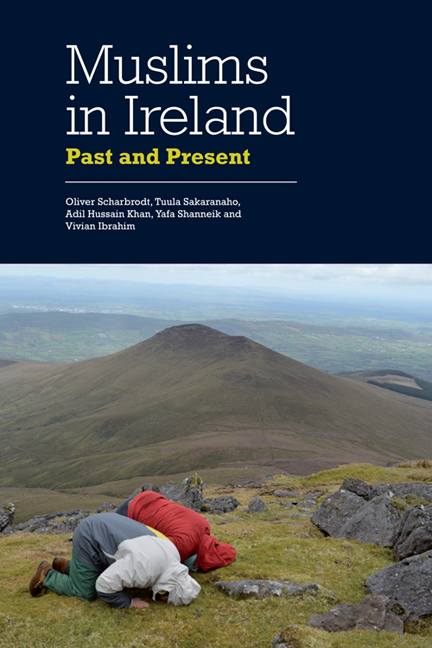Book contents
- Frontmatter
- Contents
- Figures
- Acknowledgements
- Introduction
- I History of Muslim Presence and Immigration to Ireland
- II Mosques, Organisations and Leadership
- III The Governance of Islam in the Republic of Ireland: Freedom of Religion and Islamic Education
- IV Diaspora and Identity
- 8 Muslim Women in Ireland
- Conclusion: Being Irish, Being Muslim
- Bibliography
- Index
8 - Muslim Women in Ireland
from IV - Diaspora and Identity
Published online by Cambridge University Press: 05 August 2016
- Frontmatter
- Contents
- Figures
- Acknowledgements
- Introduction
- I History of Muslim Presence and Immigration to Ireland
- II Mosques, Organisations and Leadership
- III The Governance of Islam in the Republic of Ireland: Freedom of Religion and Islamic Education
- IV Diaspora and Identity
- 8 Muslim Women in Ireland
- Conclusion: Being Irish, Being Muslim
- Bibliography
- Index
Summary
Introduction
This chapter provides an overview of the diversity of the Muslim women's presence in Ireland by analysing the narratives of over one hundred Irish women converts to Islam and of Sunni and Shia Muslim women migrants coming from Algeria, Libya, Egypt, Sudan and Iraq. The socio-economic, educational and residential status in Ireland of these women, as well as their political orientations, are as diverse as their religious affiliations and understandings of Islam. The research material in this chapter involves several in-depth interviews, numerous focus group discussions and participant observations with women in their homes, as well as during their visits to various mosques or religious centres in different parts of Ireland including Dublin, Cork and Limerick. This fieldwork research spanned the period between September 2009 and December 2013. While the ethnographic material presented here merely provides a snapshot of diverse Muslim women's lives in Ireland, this chapter illustrates the various factors and dynamics impacting on their identity-formations and discusses ‘real-life’ Islam as practised and understood by these women.
Despite the diverse backgrounds of the women interviewed here, all share what Cohen refers to as the fragmentation and multiplication of identities. Werbner talks in this context about complex or segmented diasporas or identities, in which the ‘borders are porous, their identities multiple, intersecting and in constant flux, shifting situationally’. In the women's accounts, one can observe a constant negotiation of their multiple identities in Europe that shift between religious, (trans)national, ethnic and/ or cultural identities. These multiple identities are emphasised in their narratives, highlighting the need these women have to belong to a specific community in order to feel secure and protected. The women's fragmented and multiple identities increase their ‘homing desire’, to use Brah's term, which refers to people's yearning for belonging and for feeling at home. This ‘homing desire’ is not necessarily related to a specific geographical location,5 but rather to a desire to belong to a particular religious, national, ethnic, cultural and/ or ‘imagined’ community.
For many of these women, religion in all sorts of forms and ideological understandings has proven to be useful in this regard, mirroring Vasquez's argument that ‘religion helps immigrants imagine their homelands in diaspora and inscribe their memories and worldviews into the physical landscape and built environment’.
- Type
- Chapter
- Information
- Muslims in IrelandPast and Present, pp. 193 - 215Publisher: Edinburgh University PressPrint publication year: 2015



